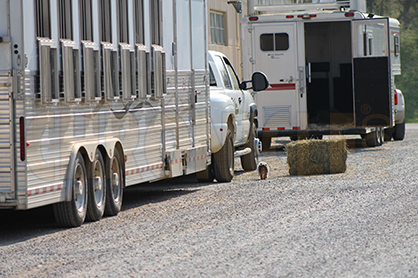Keeping Horses Comfortable in the Trailer During Winter Travel
Winter travel for horse owners creates a fear of trailering due to the lack of confidence as to whether or not our horse is comfortable. While we have the amenity of a heated vehicle and some of us with heated seats, our horse’s comfort during winter travel depends on the owner.
When preparing for a trip, one of the most common questions is: Should I blanket my horse? While some of this depends on how cold the temperature is, it also depends on the thickness of your horse’s winter coat – if he has one. Most horses in the show industry are kept under lights for 16 hours or more per day to prevent a winter coat from growing; thus calling for heavy layered blankets during subzero temperatures. Horses that are body clipped fall under this category as well. Whereas if your equine partner is au-natural (a.k.a.: fuzz ball), he may not need a heavy blanket, but rather a sheet to block the wind (especially if you have a stock trailer with open sides or windows that do not close).
Your trailer should be well-ventilated. Hay, dust, shavings, manure and urine can create toxic air. Body heat also plays a big role. Horses are most comfortable in 50-60°F (12°C), so a cold horse is less of a problem than an overheated horse. If you have an enclosed trailer, heat can build up quickly triggering sweating, leading to dehydration. Air should be circulating throughout your trailer, but try to keep direct air flow from your horse. If you have roof vents, run them in reverse (open to the rear) so they will draw air away from the horse. You can get quite a breeze when traveling a highway. You can also crack your trailer windows to allow continual airflow.
Keeping your horse hydrated is just as essential in cold weather as it is in hot weather. When horses are in a trailer with heavy blankets, they sweat causing fluid loss and allowing dehydration to set in quicker than you think. If you are making a long haul cross country, you should stop every 3-4 hours to water your horse. While some horses are likely to drink less in winter, it is still crucial to offer them warm water. If you have a nervous horse, this is especially imperative because he sweats much more.
Now and again Old Man Winter decides that you don’t really need to make that show and spoils your plans. You now not only need to find a place for you to stay, but also a suitable stable (with appropriate shelter) for your equine partner. While there are places that offer overnight stabling, this abrupt planning can be avoided by checking the weather every day throughout your journey. If you see that you’re headed for bad weather, call ahead to a place and make arrangements. Some sources are: www.overnightstabling.com, www.horsetrip.com , www.horseandtravel.com and www.horsemotel.com. Have a Plan B before roads become impassable. Food for thought- Keep common sense and safety at the top of your list rather than the need to meet a schedule in menacing weather.
USRider – in its 13th year of operation – is the only company to provide emergency roadside assistance for horse owners. Through the Equestrian Motor Plan, USRider provides nationwide roadside assistance and towing services along with other travel-related benefits to its Members. The plan includes standard features such as flat-tire repair, battery assistance, lockout services, and roadside repairs for tow vehicles and trailers with horses, plus towing up to 100 miles. As an additional service, USRider maintains a national database that includes emergency stabling, veterinary and farrier referrals.
For more information about the USRider Equestrian Motor Plan, visit www.usrider.org online or call (800) 844-1409. For additional safety and travel tips, visit the Equine Travel Safety Area on the USRider website at www.usrider.org.
About the Equine Network
The Equine Network provides, creates, and distributes relevant content and services to passionate horse enthusiasts while connecting them to each other and the marketplace. The Equine Network is the publisher of award-winning magazines: Horse & Rider, EQUUS, Dressage Today, The Trail Rider, Spin to Win Rodeo, American Cowboy, Practical Horseman, and Horse Journal. The Equine Network also publishes a proprietary line of books and DVDs for sale through its store, HorseBooksEtc.com. The Equine Network provides emergency roadside assistance through its acquisition of USRider, and is home to several websites including: EquiSearch.com, Equine.com, MyHorseDaily.com, DiscoverHorses.com, Horse-Journal.com, and AmericanCowboy.com











